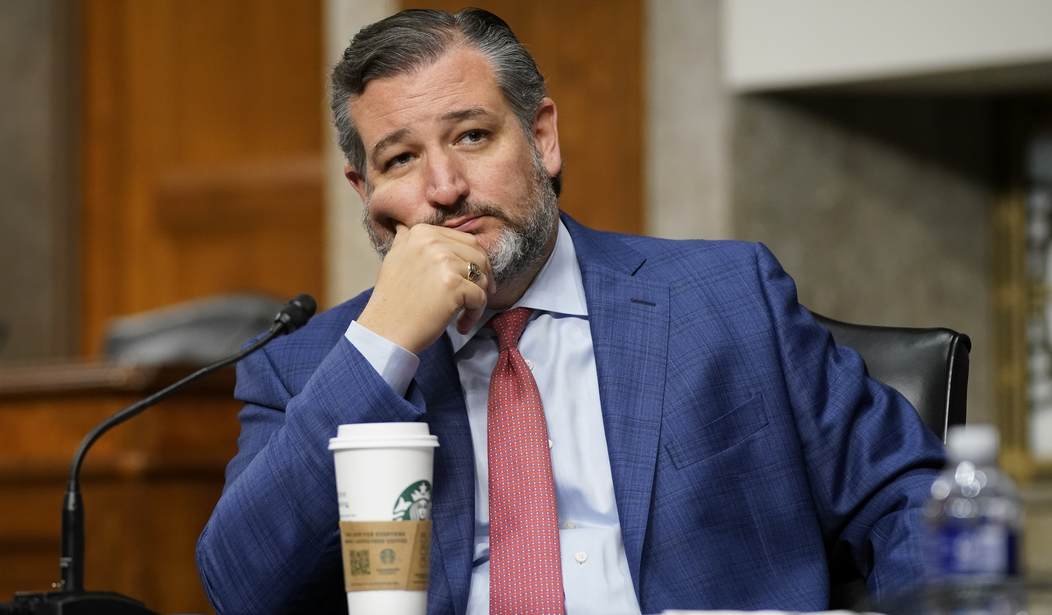In a week of Sunday shows dominated by coverage of the situation in Ukraine, "Fox News Sunday" had Sen. Ted Cruz (R-TX) on the program to offer his take. Sen. Cruz is not merely a member of the Senate Foreign Relations Committee, but, as he reminded host Bill Hemmer, he's offered solutions to dealing with Russia's Vladimir Putin that the Biden administration don't seem to be listening to.
That solution as Sen. Cruz and even many Democrats in Congress see it, is sanctions. Last month, the Senate voted 55-44 to impose sanctions on Nord Stream 2. Though the bill had bipartisan support, it failed to overcome a filibuster. Ironically, this failed vote took place as Democrats were lamenting that the existence of the filibuster impeded the passage of what they referred to as voting rights legislation, but which in reality would leave to a federal takeover of elections.
"When we voted, I won a bipartisan majority, a big bipartisan majority, 55- 44. But the Democrats filibustered the bill. They demanded 60 votes, ironically while at the same time they were calling the filibuster Jim Crow racist relic from the past. That same day they were filibustering to protect Russia and Putin, and 44 Democrats gave in to political pressure from the Biden White House. They voted in favor of Russia, against sanctions," Cruz told Hemmer.
Such a vote had occurred in 2019, too, actually, which resulted in then President Donald Trump signing sanctions into law. As Cruz reminded Hemmer, though, while Putin had previously halted the construction of Nord Stream 2, he began building it soon after President Joe Biden took office.
"Because [Putin] knew what was going to happen -- was going to happen, which was that Joe Biden formally waived sanctions on Russia, on Putin, and gave the green light to build Nord Stream 2. That is why we have over 100,000 troops and Russian tanks on the border of Ukraine preparing to invade. That's why we're on the brink of war in Europe," Cruz offered.
Recommended
Further, as Nord Stream 2 continues, Biden halted the Keystone Pipeline upon taking office, thrusting the country into a state of energy dependency.
While more Democrats voted in favor of sanctions in 2019, Cruz highlighted the obvious. "But the difference was last time you had a president within and "R" behind his name. Now you've got a president with a "D" behind his name," he said.
As Cruz reiterated during the segment, Ukrainian officials, including President Volodymyr Zelensky, have asked for sanctions on Nord Stream 2.
The Sunday shows have shown clips of Zelensky, at the Munich Security Conference, repeating calls he's made in the past urging sanctions. "What are you waiting for? We don't need your sanctions after the bombardment will happen and after our country will be fired at or after we will have no borders, after we will have no economy or parts of our country will be occupied," Zelensky had asked of other leaders.
Biden himself, Cruz shared, came to lobby Democrats to vote against Cruz's bill. "Joe Biden becoming president is the best thing that ever happened, tragically, for Vladimir Putin," Sen. Cruz charged.
Joe Biden becoming president is the best thing to happen to Vladimir Putin. pic.twitter.com/jAIK6qDH69
— Ted Cruz (@tedcruz) February 20, 2022
Another point Cruz referenced about Ukraine was how the catastrophic withdrawal from Afghanistan made it more likely such an invasion would occur. The Biden administration, though, has stuck to claims that the two foreign policy crises are not the same, using the talking point that the Biden administration was ending a war in Afghanistan, whereas they're trying to prevent one this time.
Such has been a narrative that White House Press Secretary Jen Psaki has used, and it was that retired Rear Admiral John Kirby, the press secretary for the Department of Defense, who was on the program earlier, used.
Kirby had also dismissed the idea of using sanctions just yet, though.
He offered the administration has "said all along that these are going to be crippling sanctions, sanctions the likes of which we have not put in place before. They're going to be unprecedented," something he stressed they intended to be "a very strong message to Mr. Putin and as a deterrent." He did argue, though, that if sanctions are applied ahead of time, "it doesn't exist anymore as a deterrent," and also stressed "we still think there's time to prevent" Putin invading Ukraine.
Secretary of State Anthony Blinken, who appeared on multiple Sunday shows himself this week, stuck to the same talking point but did not exactly have the most comforting responses to offer when pressed by several hosts about sanctions, particularly when it comes to Zelensky's request.
During his interview with CBS' "Face the Nation," Blinken reiterated the deterrent effect of sanctions that Kirby also mentioned. He also promoted how the Biden administration has provided assistance to Ukraine and offered that they "are doing everything we can to both help Ukraine defend itself and to make clear what will happen to Russia if it undertakes this aggression."
Blinken made the same points on CNN's "State of the Union," resulting in a pushback from host Dana Bash who pointed out "it seems as though we're hearing two competing notions," with Biden being adamant that Putin has already decided to invade.
On NBC's "Meet the Press," Blinken emphasized to host Chuck Todd the "prospect" of sanctions. He also offered "we're going to try everything we possibly can to get President Putin to reverse the decision we believe he's made, and to dissuade him" and stressed they're "trying to prevent a war."
During previous Sunday show appearances from last month, Blinken was similarly dismissive of using sanctions yet, despite the wishes of Zelensky.

























Join the conversation as a VIP Member